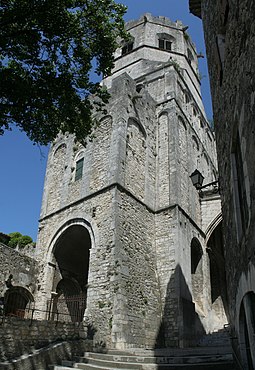Diocese of Viviers
|
Diocese of Viviers Dioecesis Vivariensis Diocèse de Viviers |
|
|---|---|

|
|
| Location | |
| Country | France |
| Ecclesiastical province | Lyon |
| Metropolitan | Archdiocese of Lyon |
| Statistics | |
| Area | 5,556 km2 (2,145 sq mi) |
| Population - Total - Catholics |
(as of 2014) 327,072 285,000 (est.) (87.1%) |
| Parishes | 24 'new parishes' |
| Information | |
| Denomination | Roman Catholic |
| Rite | Roman Rite |
| Established | 4th Century |
| Cathedral | Cathedral of St Vincent in Viviers, Ardèche |
| Patron saint | Saint Vincent |
| Secular priests | 98 (diocesan) 44 (Religious Orders) |
| Current leadership | |
| Pope | Francis |
| Bishop | Jean-Louis Marie Balsa |
| Metropolitan Archbishop | Cardinal Philippe Barbarin |
| Emeritus Bishops | François Blondel Bishop Emeritus (2000-2015) |
| Map | |
 |
|
| Website | |
| Website of the Diocese | |
The Roman Catholic Diocese of Viviers is a diocese of the Latin Rite of the Roman Catholic church in France. Erected in the 4th century, the diocese was restored in the Concordat of 1822, and comprises the department of Ardèche, in the Region of Rhône-Alpes. Currently the diocese is a suffragan of the Archdiocese of Lyon. Its current bishop is Jean-Louis Marie Balsa, appointed in 2015.
Saint Andéol, disciple of Saint Polycarp, evangelized the Vivarais under Emperor Septimius Severus and was martyred in 208.
The "Old Charter", drawn up in 950 by Bishop Thomas, the most complete document concerning the primitive Church of Viviers, mentions five bishops who lived at Alba Augusta (modern Alba-la-Romaine): Januarius, Saint Septimus, Saint Maspicianus, Saint Melanius and Saint Avolus. The last was a victim of the invasion of the barbarian Chrocus (the exact date of which is unknown).
In consequence of the ravages suffered by Alba Augusta, the new bishop, Saint Auxonius, transferred the see to Viviers about 430. Promotus was probably the first Bishop of Viviers; the document also mentions later several canonized bishops: Saints Lucian and Valerius (fifth and sixth centuries); Saint Venantius, disciple of Saint Avitus, who was present at the councils held in 517 and 535; Saint Melanius II (sixth century); Saint Eucherius, Saint Firminus, Saint Aulus, Saint Eumachius, Saint Longinus (seventh century); St. Arcontius, martyr (date unknown, perhaps later than the ninth century.
...
Wikipedia
